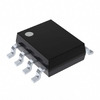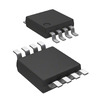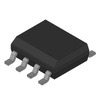Manufacturer Part Number
MAX6126AASA30+T
Manufacturer
Analog Devices
Introduction
The MAX6126 is a high-precision, low-noise, ultra-low-dropout voltage reference. This model is widely utilized in power management applications requiring a stable and precise reference voltage.
Product Features and Performance
Series Reference Type providing stable output
Fixed Output Type with an output voltage of 3V
Output current capacity of 10 mA
Low temperature coefficient of 5ppm/°C ensures minimal deviation with temperature changes
Ultra-low output noise of 1.75µVp-p from 0.1Hz to 10Hz
Supports wide input voltage range from 3.2V to 12.6V
Low supply current requirement of 725µA enhances power efficiency
Product Advantages
Exceptionally low noise performance enhances signal integrity
Highly accurate with ±0.02% tolerance providing precise voltage
Robust operating temperature range from -40°C to 125°C suitable for harsh environments
Key Technical Parameters
Voltage Output (Min/Fixed): 3V
Current Output: 10 mA
Tolerance: ±0.02%
Temperature Coefficient: 5ppm/°C
Noise 0.1Hz to 10Hz: 1.75µVp-p
Voltage Input: 3.2V ~ 12.6V
Current Supply: 725µA
Operating Temperature: -40°C ~ 125°C
Quality and Safety Features
Stable performance across a wide temperature and voltage range ensures reliable operation
Compatibility
Compatible with a wide range of microcontrollers and digital systems that require a 3V reference
Application Areas
Precision instrumentation
Data acquisition systems
Medical devices
Industrial controls
High-end audio applications
Product Lifecycle
The MAX6126AASA30+T is currently in active production with no plans for discontinuation. Replacements and upgrades are available within the same family.
Several Key Reasons to Choose This Product
Unmatched low noise output for sensitive applications
High precision and stability for critical measurements
Wide input voltage range allowing for flexible power design solutions
Robust thermal performance suitable for a variety of operating conditions
Efficient power usage contributing to energy saving in systems


 MAX6126B30Analog Devices / Maxim Integrated
MAX6126B30Analog Devices / Maxim Integrated MAX6126B25+Analog Devices Inc./Maxim IntegratedIC VREF SERIES 0.1% 8UMAX
MAX6126B25+Analog Devices Inc./Maxim IntegratedIC VREF SERIES 0.1% 8UMAX MAX6126AASA25Analog Devices Inc./Maxim IntegratedVOLTAGE REFERENCE
MAX6126AASA25Analog Devices Inc./Maxim IntegratedVOLTAGE REFERENCE